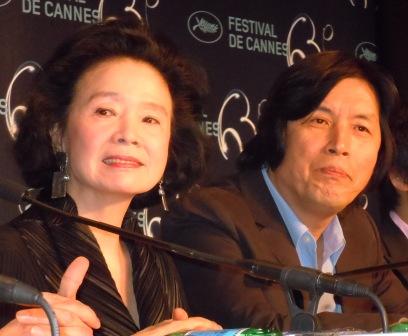Beautiful actress Yoon Jeong-hee gave me the sweetest most bashful smile at the Cannes press conference for the new Korean film Poetry, as I asked director Lee Changdong what poetry really means. Indeed, this smile spoke more for the film than the director's own words. Yoon plays a 65 year old enchantingly pretty woman (Mija), in fairy-tale dresses with flowers and white hats, who leads a delicately modest life in a quiet Korean town, while pursuing her new passion to learn how to write a poem. Unfortunately, her sweet existence is marred by some of the darker aspects of life -- an old crippled man (her boss) who asks her to have sex with him in the bathtub, "so he can feel like a man", and news that a girl has thrown herself over a bridge, because her teenage grandson along with his buddies had been gangraping her for months.
Still "Mija" continues to attend her beloved poetry class, along with other well-meaning would-be gentile poets, to listen to the instructor teach them how to "look at an apple". She studiously carries around a notebook, describing flower petals in her path. And when going to meet the mother of the suicide victim, to offer condolesences, she is so distracted by the beauty of the flowers that she rhapsodizes about colors and petals, forgetting her subject.
Another reason she forgets her subject is that she has Alzheimers.
"Are Alzheimers and poetry equated?" I asked the director. "Are you saying that poetry is a means of forgetting rather than confronting?"
"Of course, poetry can be used to forget reality -- as the woman forgets the subject of the rape when she sees the flowers. But I also want to show poetry is life. Finding joy in the little things. The invisible forces behind things."
The problem with the film is that it has the same vagueness as the director's words, when it comes to its deeper meaning. Beautifully shot in the Korean countryside---and bearing such a sensitive message---the film, for all its lyricism, never hits the poetic punchline. We glean that poetry is the answer---and we are moved by the would-be poets' attempts (in stumbling monologues) to discover the beauty in their lives (this is a true highlight in the film)---but somehow it remains wishful thinking.
The final image is the river again, with the poetry teacher narrating a poem called "Agnes' Song" (about the dead teenager). Mija has finally produced her first poem. Like a film -- the director himself equated poetry to cinema--the poem has the last word over the tragedy. Images -- we intuit -- are what remain. The floating water, the words.
Yet the poem itself (written by the director) lacks splash.

